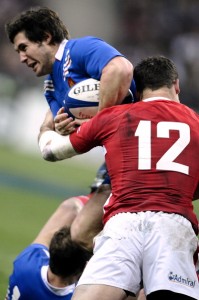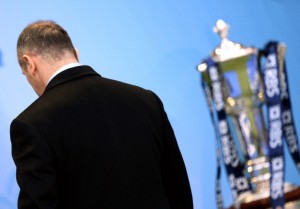
Oh Freddie: Monsieur Michalak looks to the heavens after France's woeful performance against Wales on Saturday
By Gavin Mortimer
THE FRENCH love a good debate and last weekend’s debacle deserves special attention. Losing in Rome to an adventurous Italian side was one thing, going down in their own back yard to a Welsh side short on confidence was a stark illustration of the problems that beset French rugby.
France have some world-class players. Thierry Dusautoir was voted the IRB Player of the Year in 2011, Frédéric Michalak was a nominee last year, and Wesley Fofana and Nicolas Mas would walk into most international sides. They showed this talent in November, thrashing Australia and seeing off the spirited challenges of Argentina and Samoa. So what’s gone wrong? How can France descend so quickly into the uninspired rabble of last Saturday night? That was the question put to centre Maxime Mermoz after the game, to which he replied: “There was a confidence and a freshness in the autumn which has disappeared. The dynamism is no longer the same, and we can really feel that. There is less joy, less insouciance, than there was in November.”
Mermoz didn’t come out and say it, but the implications of his words were as plain as the bruises on his face: the French players are being worn down by the demands placed on their weary bodies.
Head coach Philippe Saint-André knew this last month, complaining to the French press about the amount of rugby his squad had played in the two months between the November Tests and the Six Nations. Toulouse No 8 Louis Picamoles, for example, an unstoppable force against Australia, played 571 minutes of rugby, while Morgan Parra racked up 542 in eight matches. And those matches were ferocious encounters, crucial Heineken Cup matches and the brute force of the Top 14.
Just before the Six Nations started I talked to Andrew Sheridan about life at Toulon and the difference between the Top 14 and the Aviva Premiership. Straight away the former Lions and England prop replied that the biggest difference was the physicality of French rugby – and this from one of the world’s strongest players. Players – particularly the front five – are bigger and heavier in the Top 14 and this means the scrum, the mauls and all the close-quarter exchanges are physically draining.
At the heart of the debate over the state of Les Bleus lies the conflict between the clubs and the federation, a power struggle that has been resolved across the Channel in England but not in France where on the same day that the national side slumped to defeat against Wales, so did Toulon to Bordeaux. As the sporting bible Midi Olympique wondered in its mournful editorial on Monday morning, were rugby fans in Bordeaux crying into their beer on Saturday night at events in Paris, or were they out celebrating their astonishing 41-0 trouncing of the Top 14 leaders? Midi Olympique had it on good authority that it wasn’t the former.
Some of the Top 14’s staunchest defenders – among them Mourad Boudjellal, the colourful owner of Toulon – have dismissed talk of a conflict of interest. He points to the Spanish football league as an example of a healthy competition that benefits the clubs and the Spain national team. It’s a specious argument. La Liga is not all it’s cracked up to be; traditionally it’s Real Madrid, Barcelona and 18 clubs making up the numbers.
As Bordeaux proved against Toulon, and as Agen have shown Toulouse, there are no easy games in the Top 14. Plus, of course, football makes nowhere near the same physical demands on its players as rugby and recovering from 90 minutes of football takes far less time than recuperating from 80 minutes of tackling 18 stone props.
Even those with a vested interest in protecting the Top 14 recognise that French rugby needs a strong national team in the shop window. “The French XV must be the priority,” Toulouse coach Guy Noves told Midi Olympique. “The most important thing is that the French team wins its matches.”
But, for that to happen, says the Racing Metro coach Gonzalo Quesada, changes must be made. “Without a restructuring of the calendar,” declared the former Argentina fly-half, “the French team will continue to struggle the way it is now.”
The power-brokers in French rugby meet in the summer to discuss the fixture schedule and Saint-André has called on everyone concerned to “shoulder their responsibilities” and do what’s best for French rugby. Trouble is, in France right now, everyone thinks they know what is best.







